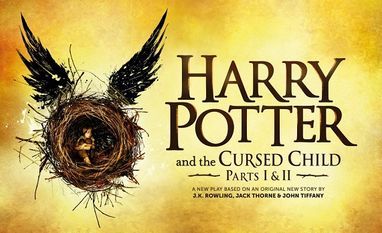I’m going to let you all in on a known secret. Growing up, I was the biggest Harry Potter fan in the world. I know that every single reader of the series says the same thing, but I was different (Yes, I was!) When I first read Harry Potter and the Philosopher’s Stone, I was 9 years old. Back then Harry was 11. By the time I turned the last page of Harry Potter and the Deathly Hallows, both Harry and I were 17. My best friend and I spent most of our pre-teen weekends fashioning robes and cloaks out of our mother’s kurtas and duppattas. As a teenager I was a part of an ‘esteemed’ Harry Potter book club with four other Harry Potter scholars. Ignoring the gloom and doom of impending Board exams, we diligently met each week and furiously debated plot lines. When anyone I knew travelled abroad, they were ordered to bring back Harry Potter merchandise, be it a wrapper, a postcard, or the replica of a quill. Therefore, when my 11-year-old niece excitedly told me that she was the biggest Harry Potter fan in the world and was going to buy Harry Potter and the Cursed Child the day it released, I scoffed at her. If only she knew who her aunt truly was.
The Epilogue of Harry Potter and the Deathly Hallows saw an older Harry dropping his son off on platform Nine and Three Quarters. To me, it was a sign that they all lived happily ever after and nothing more. So when I started reading Harry Potter and the Cursed Child, the stage adaptation of the story by JK Rowling, which picks up where the Epilogue left, I didn’t quite know how to approach it.
Childhood is never as effortless as its recollections in adult life. However, Cursed Child reflects the anxieties of childhood and pits it against the complexities of adulthood. The protagonist of the play is not the Boy-Who-Lived but his son Albus Severus Potter, who struggles with the insecurity of not living upto his famous father – especially after being sorted into Slytherin. His best friend Scorpius, who happens to be Draco Malfoy’s son, is himself tormented by rumours that he may be Voldemort’s son. Though it seems contrary, their friendship depicts that it is neither a Hogwarts house nor parentage that cements a relationship. Rather in true JK Rowling style, it is kindness, empathy, principles, and the want for similar misadventures through life that defines who we truly befriend. This unlikely bond falls in line with the other great friendships we have witnessed at Hogwarts – between the four Marauder’s, (James Potter, Sirius Black, Remus Lupin and Peter Pettigrew) and between Harry, Ron, and Hermione.
It is wonderfully reassuring to see characters, who were inseparable as 11 year olds, as inseparable colleagues, family and dearest friends, even 19 years later. Harry is the Head of Magical Law Enforcement at the Ministry of Magic, beleaguered with paper work, and battling his inability to express himself to Albus. His past has shaped him in ways he fails to understand. His wife Ginny is the Sports Editor for the Daily Prophet and she constantly worries about her children and their father. Hermione is Minister of Magic, and married to her best friend Ron, who runs a joke shop and happily looks after their two children. Their camaraderie, an understanding of each other’s quirks, along with the compulsion to fight every battle together is as it was in the Gryffindor common room.
Time plays a crucial role, both in the literal and also the metaphorical sense. The play’s underlying question is simple – if we could go back in time and change our past, would it leave our present better or worse? The play goes beyond death, and questions existence in itself. How different would our world be, if someone of significance in it, simply never existed? And what would happen if events didn’t take place in the sequence that they did?
The binaries of good and evil are explored as they were in the series and the plot twists are equally shocking. There are a few inconsistencies – which I can't discuss without giving away any more of the plot. I particularly missed Rowling’s narration and the depiction of the world she previously wove in the series. However, the script contains the theatrical flair and emotional tugs for a brilliant performance and it should be read for what it is – a play and not a book.
According to JK Rowling, this is the last Harry Potter story. For each one of us – the biggest fans of Harry Potter – this is devastating. The Harry Potter series have always been more than a mere tale for children. While at its core, it is the story of a boy defeating an evil wizard, it has always been about the persevering friendships, unexamined bravery and unflinching sacrifices that led to Voldemort’s defeat. To paraphrase Dumbledore, it is about finding happiness in the darkest of times.
Harry Potter and the Cursed Child takes this narrative further and but it has its own resounding message. Though childhood and adult life come with their disappointments, growing up is about gracefully accepting the fact that neither circumstances nor the best of people are ever perfect. And even here we realize that at the end, despite all odds, “All was Well”.
Sarah Farooqui is a pathological reader and bibliomaniac currently based in Bangalore. She was previously the Editor of Pragati – The Indian National Interest Review and and ran the Takshashila Institution's flagship Graduate Certificate in Public Policy course. She discusses fiction & non-fiction writing on her blog - The Bookend, a part of Business Standard's platform, Punditry.
She tweets as @sarahfarooqui20
)